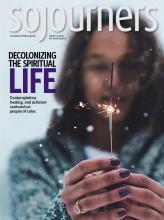WHEN JONATHAN MCGUIRE leaves his driveway, he has a choice. Turn right, and the pastor of Rockaway Beach, Mo.’s Bridge of Faith Community Church will hit the state highway with a clean shot into the thriving tourist mecca of Branson. Turn left, and he’ll find himself in downtown Rockaway Beach, a community left behind in Branson’s tailwinds.
Early on, McGuire’s neighbors gave him some sardonic, not-quite-tongue-in-cheek advice. They told him: “Never turn left.” Turning left, says McGuire, means “you have to acknowledge that there’s a problem.”
And yet, despite the difficulties, McGuire and his congregation have turned left into the heart of the uncomfortable messiness of poverty, but also into the heart of their community.
They’re not alone. I went looking for congregations living a vision for biblical social justice along the unique contours of rural America. I spoke to leaders seeking a just and hopeful future for their communities and discovered stories of people who are building relationships, advocating for the common good, and agitating for culture change.
Mobilized by love of neighbor
The economic reality of rural America is diverse. Pockets of robust growth exist within driving distance of vibrant cities and gorgeous natural amenities. Yet many towns face profound challenges. They’re communities fractured by generational poverty, addiction, and—perhaps surprisingly in breadbasket regions—food insecurity.
In places like this, it’s often the rural church that takes on the role of change agent. Social justice runs deep in the scriptures, given voice by the Old Testament prophets, embodied in Jesus’ life, and lived out in the upside-down economics of the early church (see Micah 6:8; Luke 4:18; Acts 2:44-45). And yet, as Jordan Rasmussen with the Center for Rural Affairs (CFRA) in Lyons, Neb., explains, social justice “can be an off-putting term for rural residents.”
Read the Full Article

